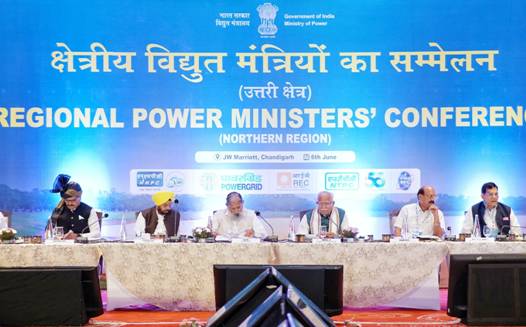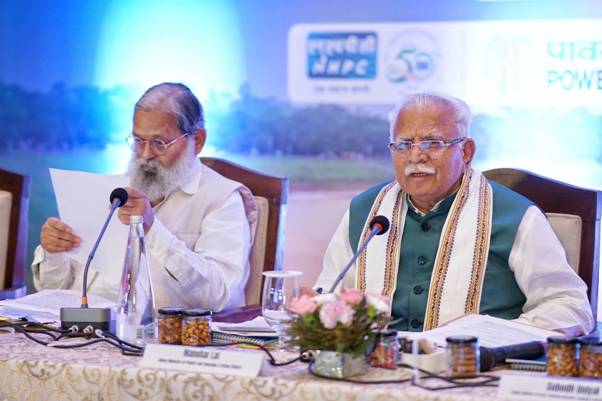Union Minister Shri Manohar Lal chairs Regional Power Conference with Northern States/ UTs in Chandigarh
Union Minister Shri Manohar Lal chairs Regional Power Conference with Northern States/ UTs in Chandigarh
The Regional Conference for the Northern Region States/ UTs was held on 06th June in Chandigarh under the chairmanship of Shri Manohar Lal, Hon’ble Union Minister of Power and Housing & Urban Affairs.
The meeting was attended by Shri Anil Vij (Hon’ble Energy Minister, Haryana), Shri Harbhajan Singh (Hon’ble Power Minister, Punjab), Shri Subodh Uniyal (Hon’ble Forest Minister, Uttarakhand), Shri A K Sharma (Hon’ble Energy Minister, Uttar Pradesh), Shri Ashish Sood (Hon’ble Power Minister, Delhi), Shri Javed Ahmad Rana (Hon’ble Jal Shakti, Environment & Forest & Tribal Affairs, Jammu & Kashmir) and Shri Heeralal Nagar (Hon’ble Energy Minister of State, Rajasthan).
The meeting was also attended by participation of the Union Power Secretary, Secretaries (Power/ Energy) of participating States/ UTs, CMDs of Central and State Power Utilities, and senior officers from the Ministry of Power.
Union Minister Shri Manohar Lal in his address mentioned that India’s power system has evolved into a unified national grid, fulfilling the vision of ‘One Nation-One Grid’ and underlined the importance of a future-ready, modern, and financially viable power sector to fuel the country’s growth. He highlighted that we successfully met a peak demand of 250 GW in May 2024 and India has transformed from power-deficit to a power-sufficient nation and as on today, peak demand shortage is zero. He outlined the importance of continuous cooperation and coordination between Central and the State Governments in achieving the goal of Viksit Bharat by 2047.
Hon’ble Minister laid emphasis on ensuring resource adequacy and necessary power generation capacity tie-ups. States should, while meeting their resource adequacy plan, also work on having adequate power generation mix including addition of nuclear generation capacity. India’s peak electricity demand is projected to reach 446 GW by 2034–35 and meeting this sustainably requires proactive planning and continued coordination between the Centre, States, and stakeholders.
Hon’ble Minister mentioned the States should work towards resolving the issues faced in development of Intra-State transmission projects, including RoW issues. States should explore diverse options for financing including from multilateral institutions. Hon’ble Minister informed all present that in the Union Budget 2025-26 allocation of ₹1.5 lakh crore in 50-year interest-free loans to support states’ capital expenditures, has been done, which can greatly strengthen the transmission infrastructure.
Union Minister remarked that States should promote renewable energy coupled with storage solutions so as to ensure reliability of supply of power. He mentioned India is moving towards having increased share of renewable energy in total installed capacity and the same has increased from 32% in 2014 to 49% in April 2025. He advised States for implementation of Renewable Purchase Obligation (RPO) Guidelines and urged States to form dedicated teams for these critical planning.
Hon’ble Minister highlighted the importance of cyber-security measures and Islanding Schemes as the effective measures to prevent power outage owing to cyber concerns and enable resilience of grid.

Hon’ble Minister mentioned that the distribution sector is the most critical link in the power sector value chain. However, it faces challenges due to poor tariff structures, sub-optimal billing and collection, and delayed payments of Government department dues and subsidies. It is essential to reduce the AT&C losses and the gap between Average Cost of Supply and Average Revenue. He asked States to engage with the Electricity Regulatory Commissions (ERCs) for cost-reflective tariffs and for timely issuance of tariff and true-up orders. He highlighted that losses of utilities today add to cost of power for consumers and also deteriorates delivery of services to consumers and further, continued losses have cascading effect.
Hon’ble Minister also highlighted that distribution utilities should further strive to improve efficiency through expediting infrastructure and smart metering works under Revamped Distribution Sector Scheme. He mentioned that timely payment of Government dues and subsidies remains a pressing issue. FY24 dues are still pending in few States, and gaps are more apparent in FY25. The State should take strong steps to timely settle them as it adversely impacts financial health of utilities. He emphasised that the pre-paid smart meters is way to ensure timely release of Government department dues. He asked States to saturate installation of prepaid smart meters in all Government establishments including Government colonies by August 2025 and to complete installation of smart meters for Commercial and Industrial consumers and high load consumers by Nov. 2025. He emphasised that the Smart meter have huge potential in transforming the way consumers interact with utilities using the data analytics based on AI/ML tools. It can help consumers derive benefits using features inbuilt into smart meter application.

Hon’ble Minister assured States for continuous support of the Central Government to the States to further strengthen the power sector and mentioned that collectively we should for “Power for All, at All Times”.
Secretary (Power), Government of India (GoI) highlighted that it is crucial to ensure necessary power generation capacity tie-ups as per the resource adequacy plan for upto FY2035 so as to meet future power demand. It is also imperative to make necessary arrangements for development of inter-state and intra-state transmission capacities through various financing models available including Tariff Based Competitive Bidding (TBCB), Regulated Tariff Mechanism (RTM), leveraging the support for infrastructure provided under Budget 2026 or through monetization of existing assets. Further, the States should make all efforts for securing the power sector infrastructure, including the transmission grid and distribution systems, against cyber security concerns and should implement necessary cyber security protocols and power islanding scheme for the same. In addition, States to also work towards ensuring financial viability of distribution utilities.